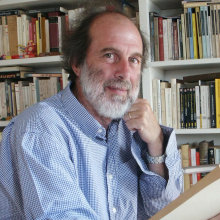Let’s talk about you: what is your background, what do you teach, and what are your research interests?
My name is Stefano Maso and I recently became full professor of History of Ancient Philosophy. I was born in Venice, near Campo San Giacomo dell'Orio. I have been interested in philosophy since high school and in 1973, at my high school graduation, I presented a paper on 'chance and necessity', comparing the arguments of Jacques Monod and Marc Oraison. I enrolled in classical studies and graduated in Latin Literature, in Venice, with Dante Nardo; my thesis, however, was already on a philosopher: Lucius Anneus Seneca. Then I began teaching in schools; in the meantime, I graduated in philosophy with Arnaldo Petterlini: my dissertation was on John of Salisbury, the mediaeval philosopher who was the first to remind us that 'we are like dwarfs on the shoulders of giants'. My latest book is dedicated to Cicero the 'philosopher' and I wrote it between Venice (where I live) and Nebbiù, a small village in the Cadore region where I spend my holidays, 'getting lost' in the mountains.
Tell us about your academic path.
I think it can be described as a traditional, Humboldtian career. For 15 years I taught at the Franchetti High School in Mestre. I returned to Ca' Foscari only in 2005, as a researcher. In 2015 I was called as associate professor and, as of 2020, as full professor. My philosophical guides include Aristotle, Epicurus, Seneca and Heidegger (the same age as my maternal grandfather).
What are your professional references?
I would certainly say, after Dante Nardo and Vittorio Citti, scholars Carlo Natali, Carlos Lévy, Gretchen Reydams-Schils. Of course, there is also a large number of colleagues who are now friends, whom I met along the way, little by little, especially during my experiences as a visiting scholar: Paris, Grenoble, Oxford, Athens, Tübingen, São Paulo, Atlanta, Bordeaux, Liège, Belfast, Edinburgh, Madrid ... In Italy, scholars of Ancient Philosophy have gathered around SISFA (Italian Society of History of Ancient Philosophy): we meet annually in an always warm and constructive climate. At Ca' Foscari the community of historians of philosophy integrates well especially with theoreticians and moral scholars.
Have you always known that this was going to be your path?
I think so; I have always been fascinated by human thought in all its forms, by the way it presents itself and re-presents itself. Understanding how we think (and what we think) is at the heart of my research and teaching. Whether with students, scholars or the classics of philosophy, this is my constant aspiration. Hence my passion, my attempt to constantly challenge myself; hence the drive towards an aspect that I consider instructive and satisfying: always risking something in research and in life. This makes me not only a true Venetian, but also a citizen of the world.
Can you offer any advice to researchers in the early stages of their career?
I recommend patience and consistency, as well as hard work, of course. The specialised dimension is important, but you still need to keep an inquisitive eye on the universe, sensitive to music and art; never settle. Most of all, I recommend finding a way to translate your science into your daily actions, into the way you lead your life.
Avoid separating research from life and its pulse. I also hope that all of you are able to practice self-irony with conviction: it is the key to avoid betraying ourselves and to make peace with everyone.

